Bogotá, Colombia’s capital, is facing a severe water shortage due to a drought associated with the El Niño weather pattern. As a result, officials have implemented water rationing in most neighborhoods and asked residents to reduce their water consumption. Mayor Carlos Fernando Galán announced new measures to further reduce water usage, including imposing additional fees on homes that use more than 22 cubic meters of water per month and threatening fines for wasteful activities like washing cars on the streets.
In an effort to conserve water, the city buses in Bogotá will now only be washed once per week, instead of daily. However, the insides of the buses will still need to be cleaned daily for public health reasons. The mayor emphasized that while water consumption has decreased since the measures were implemented, there is still a long way to go to reach the desired goals. The city’s main source of water, the Chingaza Reservoir System, is currently at its lowest level ever at 15% full, and experts warn that the reservoirs could run out of water in two months if no rains return to the area.
To address the water shortage, Bogotá officials have implemented a water rationing system that divides the city into nine zones, each of which is cut off from the water supply for 24 hours on a rotating basis. The mayor stated that water consumption needs to fall to 15 cubic meters per second in order for the reservoirs to recover. In addition to rationing, city officials have been urging residents to use less water by limiting showers to five minutes, turning off taps while brushing teeth, and even suggesting that people shower less frequently.
The water shortage in Bogotá is a rare occurrence for the city, which is typically located in a humid region surrounded by cloud forests and green fields. However, several months of dry weather caused by the El Niño weather phenomenon have destabilized the city’s reservoirs and led to forest fires. As a result, the city is facing one of its most severe water shortages in recent history. Mayor Galán emphasized the importance of not only reducing consumption through rationing but also changing behavior to further conserve water.
In addition to the measures implemented by officials, the mayor has urged residents to take individual steps to reduce water usage. This includes avoiding wasteful activities like long showers and washing cars on the streets. Galán also emphasized the importance of collective action in facing the water shortage, stating that the city needs to come together to address the crisis. As the drought in Bogotá continues to worsen, residents are being asked to make significant changes to their daily routines to help conserve water and prevent further depletion of the city’s water supply.













